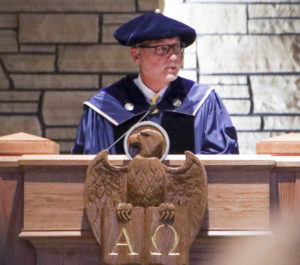 “Tune yourselves to Wyoming Catholic College!”
“Tune yourselves to Wyoming Catholic College!”
Matriculation Address, August 22, 2022
by Dr. Glenn Arbery, President
Reverend Fathers, Directors of Wyoming Catholic College, faculty and staff, returning students and members of the class of 2026:
This morning we gather to engage in a ritual that goes back for many centuries into the early history of universities. To matriculate is to “to be entered as a member of a university or college, to become a member of a body or society.” Everyone who has ever taken classes here is enrolled in the book that the freshmen will sign—the register, the matricula. Each person adds his or her name to the names of all those that have come before, including the upperclassmen now present, but also all our graduates, so that this book symbolizes in its way the College in its existence over time, both in the way it abides and in the way it changes.
Last night when Dean Washut and I were greeting the freshman in Frassati, I read them a poem by Richard Wilbur called “The Beautiful Changes.” Two lines in the middle stanza seem to me particularly appropriate for what happens today—or I should say for what is beginning to happen. In writing about what beauty is, Wilbur does not try to seize upon it as a single, fixed, and unchanging thing but as a reality that changes as we encounter the particulars of the world. “The beautiful changes as a forest is changed/By a chameleon’s tuning his skin to it.” We understand how the chameleon changes. He tunes his skin to the forest—wonderful metaphor, by the way, tuning as though his skin were an instrument harmonizing with the larger music. He takes on the coloration of what is already there and disappears into it.
But how is the forest changed? How does Wyoming Catholic College change as each student writes his or her name and begins to take on the daily life of classes and meals, conversations and prayers? It’s something like this: Each one of you has to encounter the whole and interpret it to become part of it, so that there is a separation and a newness like what the chameleon does in achieving disappearance, so to speak. “The beautiful changes/in such kind ways,” Wilbur writes, “wishing ever to sunder/things and things’ selves for a second finding.” Each one of you freshmen allows us that “second finding” of what Wyoming Catholic College is. With each student who enters the curriculum wholeheartedly, who attunes his or her individuality to the community, this beautiful wholeness subtly changes.
 As part of our celebration this morning, we sang “America the Beautiful,” which for most of us who grew up in this country is one of the patriotic songs that we know by heart. It bears with it lifelong associations. It cannot hurt this morning to sunder us a little bit from our familiarity with it to think about the patriotism it encourages as another analogy to matriculation, not only to the way we as individuals fit into the song itself, as we did when we sang it together, but also into the larger body it celebrates.
As part of our celebration this morning, we sang “America the Beautiful,” which for most of us who grew up in this country is one of the patriotic songs that we know by heart. It bears with it lifelong associations. It cannot hurt this morning to sunder us a little bit from our familiarity with it to think about the patriotism it encourages as another analogy to matriculation, not only to the way we as individuals fit into the song itself, as we did when we sang it together, but also into the larger body it celebrates.
Katherine Bates, who wrote “America the Beautiful,” was an English professor at Wellesley College in Massachusetts, and she composed this hymn to America in 1893—more or less the era of The Virginian—when she was teaching in Colorado Springs over the summer. She and some friends climbed Pike’s Peak, though I think they did it in a wagon. The view back over the great grasslands of the plains gave her the images that inform the first stanza: “O beautiful for spacious skies,/ for amber waves of grain / for purple mountain majesties /above the fruited plain.” The America she had known back East gave way to this much more spacious and immense vision whose possibilities inspired her to pray for the nation still coming into being: “God shed his grace on thee/ and crown thy good with brotherhood/ from sea to shining sea.” I remember the resonance of those lines from my childhood: “from sea to shining sea.”
But the focus of the hymn, to my mind, comes in the second stanza. “Oh beautiful for pilgrim feet/whose stern impassioned stress/a thoroughfare for freedom beat/across the wilderness.” What Bates praises might be problematic to some. The pilgrim feet belonged to the stern Puritans who had separated themselves from the religious constraints of old Europe in order to begin anew in this country. They were deeply Christian, but also deeply anti-Catholic, and yet in our embrace of the heroism of those first European settlers on the Atlantic shore, we praise what they did. It’s interesting that Bates imagines the way they walked, the stern impassioned stress of their feet—the deliberateness of what they did. Those firm feet—which you feel in the meter—are an image of determined self-rule, and firm-footed self-government became an early expectation in America.

Bates is dealing with something of a paradox, which is that the sternness of the beginning paved the way for our own freedom. Without those stubbornly self-governing pilgrims, we would not have the Constitution or the habits of liberty that we enjoy regardless of our political divisions. We give ourselves to this affirmation of America, because the whole of “America the Beautiful” is a prayer. We open our failings to divine Providence: “America, America,/ God mend thine every flaw./ Confirm thy soul in self-control /Thy liberty in law.”
This passage did not impress me as a child, but it has always done so since I encountered the Great Books in college and graduate school. In two lines, Bates gives a wonderful guide to participation in community: “Confirm thy soul in self-control,/Thy liberty in law.” She articulates the way of tuning our skin to the larger whole in which we participate to realize most fully who we are. When I was thinking about these lines a couple of years ago, I realized that a great deal is compacted into the word soul. It evokes 19th century romantic heroes—great, striving, sublime figures like Napoleon impatient with all boundaries. Bates has such heroes in mind, but she also draws upon the classical idea of magnanimity, “greatness of soul,” the crown of the moral virtues that Aristotle describes in the Nicomachean Ethics. The strongest soul overcomes its own unruly impulses and manifests its virtues through an inner equilibrium; it is like tuning an instrument.
The song also urges America to confirm her “liberty in law.” Liberty is sometimes construed to mean breaking free of all constraints, like an escaping prisoner. the law is no prison for those who exercise their liberty in choosing its restraint. In fact, America confirms her liberty—makes it firmer, gives it a more established strength—through obedience to law.
 Being part of this community is a kind of citizenship, and I think the crucial thing to understand is that we are social by nature. What is distinctive and original about us can only come into its fullest reality among others. I think of Shakespeare, who did not stay at home in Stratford, sticking to himself and trying to be original by rejecting association with others and scorning their inferiority. He went to London, plunged into the thick of the theatrical Renaissance, met the most brilliant poets of the age, and discovered his originality in outdoing them all. He was a great chameleon of the Western tradition, revealing it to itself. Shakespeares are rare, of course, but the point holds: we celebrate what we can achieve individually because of the whole we make together.
Being part of this community is a kind of citizenship, and I think the crucial thing to understand is that we are social by nature. What is distinctive and original about us can only come into its fullest reality among others. I think of Shakespeare, who did not stay at home in Stratford, sticking to himself and trying to be original by rejecting association with others and scorning their inferiority. He went to London, plunged into the thick of the theatrical Renaissance, met the most brilliant poets of the age, and discovered his originality in outdoing them all. He was a great chameleon of the Western tradition, revealing it to itself. Shakespeares are rare, of course, but the point holds: we celebrate what we can achieve individually because of the whole we make together.
Freshman, I invite you to tune yourselves to Wyoming Catholic College, which will change in beautiful ways the more you do so. You will not lose your identity but discover it.

